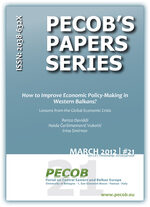and Balkan Europe
by IECOB & AIS Università di Bologna

This area collects and offers a wide range of scientific contributions and provides scholars, researchers and specialists with publishing opportunities for their research results
How to Improve Economic Policy-Making in Western Balkans?
March 2012 | #21
by: Renzo Daviddi, Naida Čaršimamović Vukotić, Irina Smirnov
pp: 25
ISSN: 2038-632X

- March 2012 | #21
Abstract
Pre-crisis high growth rates of the Western Balkans were fuelled by domestic demand financed through capital inflows from abroad. This, coupled with low domestic savings, increased vulnerability to the external shocks that followed.
Four main external transmission mechanisms relayed economic crisis to the region: global-scale exports collapse, reduction in remittances, reduced foreign bank lending, and sharp decline in foreign direct investments. Western Balkans public sector failed to provide an adequate response to the crisis. In absence of timely expenditure restructuring and consolidation reforms, most countries failed to adapt to a sharp revenue decline, resulting in deterioration of fiscal positions. There was no capacity for fiscal stimulus packages comparable to those of developed economies. Inability to adequately address the sharp revenue decline translated to most of these countries reverting to extensive borrowing. Although some of the financing was provided in support to public sector reforms, most of these reforms have been delayed. In addition, the failure to consolidate expenditures has, besides the reduction of public sector capital spending, crowded-out already insufficient private sector investments.
Main lessons for the future policy-making in the Western Balkans are as follows:
1. growth agendas need to be revisited to include: focus on the supply side of economy, improvements to total factor productivity through capital deepening, boosting domestic saving and attracting foreign financing for tradable and exporting sectors, as well as fiscal consolidation and increased effectiveness and efficiency of public sector;
2. productive investments need to be stimulated through investment climate improvement and encouraging investments into export-oriented and import-substituting sectors;
3. infrastructure investments are needed;
4. productivity-enhancing investments need to be coupled with a skilled workforce (requiring investment in human capital, research and development, and education systems), paid in line with its productivity; and
5. inappropriate budgetary policies require immediate attention of the policy makers through definition of clear country-wide national priorities and freeing up fiscal space for capital expenditures conducive to private sector investments by reduction of current expenditures.
This should be supported by reinforced medium-term budget planning processes, documents and institutions, as well as by establishment of close monitoring of expenditure developments
Keywords
Western Balkans, economic crisis, policy-making, growth agenda, investment, fiscal policy
Table of contents
About PECOB’s people
Abstract
Keywords
Introduction
1. How did the Western Balkans countries enter the crisis?
2. Economic crisis and policy (non-) response
3. Economic policy-making: what should be done differently?
3.1. Growth agendas need to be revisited.
3.2. Attracting and stimulating productive investments
3.3. Infrastructure investments
3.4. Productivity-enhancing investments
3.5. Inappropriate budgetary policies
4. Instead of a conclusion
References
About the authors
Creative Commons License
About PECOB
PECOB calls for papers!
Tables in the text
Charts in the tex
Download the paper
Version
Ver.: 01
Time stamp: 201203301058


 Download the full paper!
Download the full paper!





